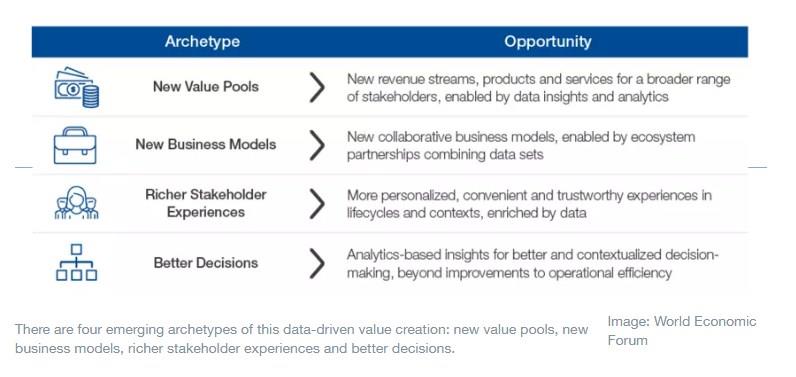by Derek O’Halloran and Francisco D’Souza*
COVID-19 has dealt the world a twin crisis. We face not only our greatest global health shock but also our greatest economic shock in a century.
With these dual crises comes a twin watershed moment. First, whether for school, work, health or keeping in touch with family and friends, we have realized the deep value of digital technologies. Second, the appetite for change (arguably a more challenging shift to achieve) has grown significantly. As we urgently reset the world’s economic foundations for a more equitable, resilient and prosperous future, these two interconnected variables come into play.
The use of technology in business has a crucial role in shaping a redefinition of economic and social systems. Digitalization is yielding vast quantities of data, which offer a wealth of possibilities for business, human well-being and the environment.
Data as a “new factor of production”
In April, the Chinese government made it official: the authorities now recognize data as a “new factor of production”, reflecting how it is changing business models, industry boundaries and market structures. Used with wisdom, a more granular data-driven understanding of communities, individuals and cells, or of complex natural ecosystems, industry value chains and materials can open new possibilities for well-being. Handled poorly, data and analytics can be used to exacerbate inequality. The former delivers benefits we cannot imagine; the latter delivers ills we can imagine all too well.
For companies large and small, around the world, their future depends on using data effectively. But this is just part of the story. Many companies feel they lack maturity or actionable understanding to be able to use data effectively. It is a source of value – but also a source of existential reputational risk or liability, regulatory constraint and commercial sensitivity. Furthermore, value and responsibility are often seen as being on opposite sides of the spectrum. These challenges stymie innovation and leave us falling short on the promise of data-driven innovations.
Yet a new wave of innovations in business models and technological capabilities – driven by companies across every sector and region – is changing this paradigm.
New opportunities
The old way of using data analytics is through a focus on increased efficiency and better post-hoc decision-making. The new way is to use data to generate top-line value. The new use cases frequently draw on data from multiple sources, generate value for multiple entities and embed both end user and partner interests. There are four emerging archetypes of this data-driven value creation: new value pools, new business models, richer stakeholder experiences and better decisions.

For example, The Machine Learning Ledger Orchestration for Drug Discovery (MELLODDY) is a consortium of 10 pharmaceutical companies, including Johnson & Johnson, AstraZeneca and GlaxoSmithKline, which is pooling data to train machine-learning algorithms and help develop new antibiotics.
Blockchain and federated learning ensure traceability while allowing data to remain on individual companies’ servers, protecting commercially sensitive and proprietary information. As the first instance in the pharmaceutical industry of a collaboration in which artificial intelligence (AI) models are both the enabler and the recipient of data sharing, MELLODDY is accelerating drug discovery, development and go-to-market timescales while reducing costs. It serves as a precedent for commercial partnerships for distributed and shared value creation for business and society.
New capabilities and technologies
A new wave of technologies are emerging that give companies new options – allowing organizations to generate insights without exposing the underlying raw data. By providing the assurance that governments seek, adoption of these technologies reduces the pressure on governments to regulate.
For example, Points uses a confidential computing framework to make data usable but not visible to multiple parties. Payment servicers are using Points to allow banks to train credit scoring and marketing models on its data; and they receive post-transaction data in return.
Duality Technologies, together with the Dana-Farber Cancer Institute and Harvard Medical School, has used a system that removes barriers to sharing and analysing sensitive genomic medical data, which is usually subject to stringent privacy protections. It supports the analysis of complex diseases, including the response to COVID-19 and the development of personalized medicine.
New paradigm for the business of data
These innovations, along with new human-centred business practices, do more than address business challenges. They also empower stakeholders and preserve individual agency and privacy. Using these new capabilities to protect the interests of all stakeholders opens new possibilities for market, revenue, experience and insight generation that is sustainable because all parties benefit.
Companies that demonstrate leadership in such models and practices not only create new opportunities, but establish trusted relationships with customers and build sustainable value. New partnerships leverage complementary strengths while protecting the core, and governments can be proactively supported in their goal to protect consumers.
The result of these new opportunities and incentives is a paradigm shift; companies can use data responsibly while developing sustainable new services and revenue streams. Since these new collaborations and partnerships are not constrained by traditional industry value chains, the cross-sectoral partnerships are eroding traditional value pools and shaping the industries of tomorrow.
A new model based on collaborative ecosystems, trustworthy data stewardship and aligning business success with better outcomes for all, is already emerging. The World Economic Forum has launched a new paper, highlighting the latest innovations to advance and refine the paradigm.
*Head of Shaping the Future of Digital Economy and New Value Creation, World Economic Forum and Co-Founder, Cognizant; Fellow, World Economic Forum
**first published in: www.weforum.org




 By: N. Peter Kramer
By: N. Peter Kramer
